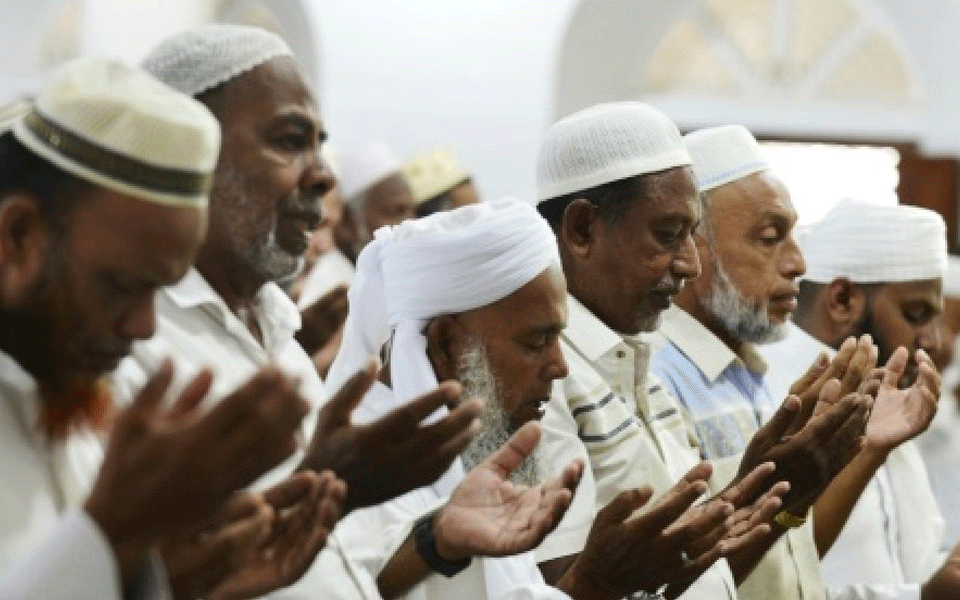Colombo: Armed police and sniffer dogs guarded mosques in Sri Lanka as Muslims trickled to Friday prayers, with many staying away over fears of revenge attacks after the island's Easter suicide blasts.
Some mosques cancelled prayers, and Sri Lanka's Muslim affairs minister called on Muslims to pray at home instead, in solidarity with churches that have closed over security fears.
Other Muslims have expressed fears that they could be targeted by Islamist hardliners, after the community's religious leadership said the attackers would not be buried at mosques in the country.
Among mosques that did hold prayers on Friday in the capital Colombo, attendance was thin, with some of the few worshippers who did show up saying they wanted to stand up to extremists.
"We are sending a message to extremists that we will not be scared or deterred," said Reyyaz Salley, chairman of the Dawatagaha Jumma mosque in the capital Colombo.
"But the main reason we are here is because we want to say a special prayer for the victims of the church bombings," he added.
At least 253 people died Sunday when attackers blew themselves up at three churches and three hotels in coordinated blasts that officials blame on local Islamist group National Thowheeth Jama'ath. The Islamic State group has claimed the attacks.
The bombings have been condemned by leaders of Sri Lanka's Muslim minority but some in the community still fear a backlash from other religious groups.
Police prevented people from walking or parking vehicles directly outside after rumours circulating on social media about possible car bomb attacks.
Sniffer dogs stood guard as police checked bags and patted down worshippers and journalists before letting them inside.
"We are not scared. We have to die one day and it can happen anywhere," a defiant Salley told AFP.
Many had been put off, however.Salley said Friday prayers at Dawatagaha Jumma Masjid regularly attracts up to 700 worshippers, but only around 100 turned up this week.
Prayers were also cut short from the usual one hour to 15 minutes because of the security situation."I have come to pray here today because I pray here everyday," 62-year-old Ahamed Riza told AFP before listening to the mosque's Imam deliver a sermon saying the Prophet Mohammed would have condemned the attacks.
Some 330 kilometres away in Muslim-majority Kattankudy on Sri Lanka's east coast, people turned out in greater numbers.More than 1,000 men and boys attended prayers at the town's main Mohiuddin Methaipali Jumma mosque.
"The attacks were carried out by a small group of people but some people are blaming the whole Sri Lankan Muslim community for this. It is not fair," mosque official Mohammed Ramesh told AFP.
"The people who did this are not human beings. All Sri Lankans must unite against this: Buddhists, Christians, Hindus and Muslims."I have been praying five times a day for the Christian victims since the attacks happened," he added.
Let the Truth be known. If you read VB and like VB, please be a VB Supporter and Help us deliver the Truth to one and all.
Dubai: Smoke was seen rising from an area near the United States Consulate in Dubai, according to witness accounts cited by Reuters.
There was no immediate official confirmation on the extent of damage or whether there were any casualties in the incident.
Earlier, the US embassy in Riyadh, Saudi Arabia’s capital, was also attacked. Authorities reported damage to the premises, but no casualties were recorded.
The developments come amid heightened tensions in the region, with Iran continuing to target US interests in the Middle East following deadly attacks launched on Saturday by Israel and the United States.
Near US embassy in Dubai pic.twitter.com/z5VTZNVxNO
— Sahil Shah (@thesahilsshah) March 3, 2026





